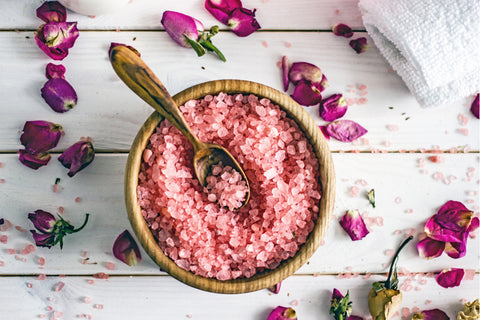Using Epsom salt for the bath is a tradition and has been used for centuries. Epsom salt is well-known for its ability to heal and relieve muscular aches, soreness, stiffness, and mental Stress.

When used in bathing sessions, Epsom salt is a sulphate and magnesium-rich natural ingredient that balances the body's magnesium intake, regulates blood circulation, balances pH, and reduces Stress. Epsom salt has numerous benefits, from treating muscle soreness to reducing skin infections, so let's look at the benefits of Epsom salt for bath and how to use it regularly.
Benefits Of Epsom Salt For Bath
Some people believe that Epsom salt only relieves pain and soreness, which is true, but it also has many other benefits. Let's look at some of these Epsom salt bath benefits.
1. Epsom Salt Bath For Stress Relieve
Epsom salt, when dissolved in warm water, is absorbed through the skin and replenishes the magnesium level in the body. Magnesium aids in the production of serotonin, which causes feelings of calm and relaxation.

Magnesium also boosts energy and endurance by stimulating the production of adenosine triphosphate. Magnesium ions also aid in relaxation and irritability by reducing the effects of adrenaline. They promote relaxation, improve sleep and concentration, and aid in properly functioning muscles and nerves.
2. Epsom Salt Bath For Muscle Cramps
An Epsom salt bath relieves pain and inflammation, making it useful in treating aching muscles, bronchial asthma, and migraine headaches.
Furthermore, it has been shown to heal cuts and reduce soreness in babies, children, and adults. Soak your aching, tired, and stinky feet in water containing half a cup of Epsom salt. Epsom salt softens skin and even eliminates foot odour.
3. Epsom Salt Bath For Neurological Advantages
Epsom salt can help manage electrolytes in your body, maintaining adequate muscle, nerve, and enzyme function.

Magnesium is also important in properly utilising calcium, which serves as a primary conductor of electrical impulses in your body. An Epsom salt bath can help people with arthritis and other inflammatory conditions by reducing swelling and providing pain relief.
4. Epsom Salt Bath For Heart And Diabetes
Bathing with Epsom salt is thought to improve heart health and aid in preventing heart disease and cerebrovascular disease by improving blood circulation, protecting artery elasticity, preventing blood clots, and lowering the risk of death from a heart attack.
It also helps to make insulin more effective. Proper magnesium and sulphate levels improve insulin effectiveness in the body and can help to reduce the risk or severity of diabetes.
5 Epsom Salt Bath For Toxic Removal
The sulphates in Epsom salt aid in removing toxins and heavy metals from the cells, relieving muscle pain and assisting the body in eliminating harmful substances.

Because your skin is a highly porous membrane, adding the right minerals to your bathwater causes a process known as reverse osmosis, which pulls salt out of your body as well as harmful toxins. At least once a week, add two cups of Epsom Salt to the water in a bathtub and soak for 10 minutes for a detoxifying bath.
How To Use Epsom Salt For Bath?
Epsom salt baths relieve muscle pain while also relaxing the mind and soul. With its lovely aromatic scents, this bath blend will also revitalise you. Let's look at how to use Epsom salt in a bath.
Ingredients
- Epsom Salt - 2 Cup
- Lavender Essential Oil - 10 ML
How To Make
- Step 1: To take an Epsom salt bath, fill a standard-sized bathtub with 2 cups of Epsom salt.
- Step 2: When placed in running water, the salt dissolves quickly.

- Step 3: Add 10 mL of lavender essential oil as well.
How To Use
- Step 1: The water temperature should be warm but not hot. Temperatures of 33°C to 37°C are ideal.
- Step 2: After that, soak in the bath for 15 to 20 minutes, or longer if desired, without using any soap.
- Step 3: People should rest for at least 1 hour after a detox bath or take a bath before bedtime so they can sleep.
3 Best Epsom Salt For Detox
There are many Epsom salt brands on the market, which needs to be clarified; let's fix that with this short list of the best Epsom salt brands for detox.
1. VedaOils' Epsom Salt
Epsom salt, a natural detoxifier derived from VedaOils, cleanses impurities, dirt, blackheads, and dead skin, resulting in radiant and healthy skin. Epsom salt from VedaOils soothes both the body and the mind and has a rejuvenating effect on you.

This VedaOils’ Epsom Bath Salt is preferred by men because it is full of muscle and strength! Regular use has resulted in a reduction in fine lines by plumping the skin and balancing moisture levels. It aids in pH regulation. Enjoy your bath while you relax and unwind!
2. Nyassa Under The Ocean Rejuvenating Bath Salts
This shower salt has a light aqua fragrance. It contains sea and Epsom salt, both known for their beneficial properties.

Sea salt relieves tension caused by muscle cramps and provides a sense of well-being.
3. Inatur Rose Bath Salt
This shower salt contains beneficial minerals and nutrients easily absorbed through the skin pores.

It has been shown to cleanse, purify, tone, and relax the body. With this essential skin nutrition product, you can treat yourself to a spa experience.
Conclusion
Epsom salt for baths can be relaxing and soothing, and there are a few drawbacks to using Epsom salts in a bath. Epsom baths, in general, can be meditative and are an excellent way to unwind from daily stresses. By soothing tired muscles and relieving Stress, Epsom salt can make your bath even more relaxing. Visit VedaOils.com to find high-quality Epsom salt at a reasonable price.
Frequently Asked Questions
Here are some frequently asked questions about Epsom Salt Bath!
Q.1 Are Epsom Salt Baths Safe For Pregnancy?
Ans: Epsom salt has almost no side effects, so pregnant women can use it while soaking in a tub. Epsom salt dissolves quickly in water. Many athletes soak in it to relieve aching muscles.

Q.2 Are Epsom Salt Baths Good For Sore Muscles?
Ans: Epsom salt is made up of magnesium and sulphate, which dissolve in water. These minerals enter your body through your skin, relaxing muscles, reducing swelling and pain from arthritis, and relieving pain from fibromyalgia and other causes.
Q.3 Is An Epsom Salt Bath Good For A Cold?
Ans: Yes, Epsom salt baths can help relax muscles and alleviate body aches caused by colds and flu. They can also aid in dilating blood vessels, which increases white blood cell production and thus aids in the speed of recovery.
Q.4 Can You Take An Epsom Salt Bath For Poison Ivy?
Ans: Yes, Epsom salt, as the name implies, has all the properties of salt and thus aids in reducing rashes and infection caused by poison ivy. It aids in the drying out of the infection and increases blood cell production.
Q.5 How Long Should You Have An Epsom Salt Bath For?
Ans: Epsom salt baths do not need to be lengthy; soak your body in Epsom salt water for 15-20 minutes for the best results.

 Home
Home Search
Search Shop
Shop Chat
Chat Profile
Profile
0 comments